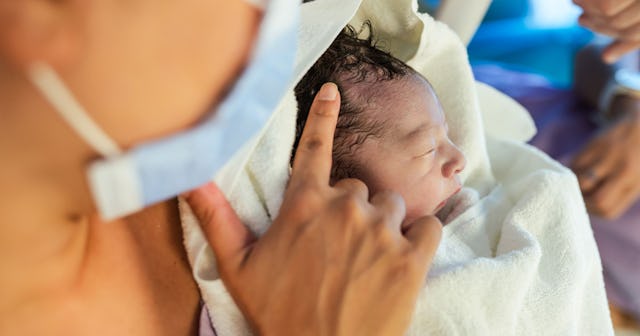Study: COVID-Positive Moms May Not Need To Separate From Their Newborns

Mothers who are infected from the virus should remain with their newborns, claims new study
Since the first cases of COVID-19 were only identified less than ten months ago, there is still so much we don’t know about the virus that has killed over 215,000 Americans. One of the most under-studied aspects of the virus is how it impacts pregnant women, the fetus, and newborn babies, as most pregnant women have been particularly careful about not exposing themselves to the virus. It has become a common practice to administer a COVID-19 test to a woman before she gives birth, so that hospitals can take precautions during and after the birth. However, according to a new study, regardless of the outcome of the test, there is possibly no need to separate a newborn from their COVID-positive mother.
The study, conducted by researchers at Columbia University Irving Medical Center and published in the peer-reviewed journal JAMA Pediatrics, found no evidence that infected mothers could transmit the virus to their newborn babies. 101 babies and 100 mothers were involved in the observational study, with 99 mothers testing positive and an additional showing symptoms but testing negative. Out of the 100 moms, 91 chose to breastfeed — wearing a mask and practicing breast and hand hygiene — and 76 chose to stay in the same room as their newborn, keeping a distance of six feet away.
“No clinical evidence of vertical transmission was identified in 101 newborns of mothers positive for or with suspected SARS-CoV-2 infection, despite most newborns rooming-in and direct breastfeeding practices,” the researchers wrote.
Their conclusion: “Our findings suggest that mothers positive for SARS-CoV-2, including those with clinical symptoms, and their newborns may not need to be separated.”
“Our findings should reassure expectant mothers with COVID-19 that basic infection-control measures during and after childbirth — such as wearing a mask and engaging in breast and hand hygiene when holding or breastfeeding a baby — protected newborns from infection in this series,” Cynthia Gyamfi-Bannerman, MD, MSc, the Ellen Jacobson Levine and Eugene Jacobson Professor of Women’s Health in Obstetrics and Gynecology at Columbia University Vagelos College of Physicians and Surgeons, and a senior author of the paper explained in a press release.
This new information is contrary to the recommendations initially set forth by the CDC and the American College of Obstetricians and Gynecology, who issued guidance in March recommending that new moms with coronavirus separate from their newborns.
“These recommendations were made in the absence of data on rates of mother-to-newborn SARS-CoV-2 transmission and are based on experience with mother-newborn transmission of other infectious diseases,” added lead author Dani Dumitriu, MD, PhD, assistant professor of pediatrics in psychiatry at Columbia University Vagelos College of Physicians and Surgeons and a pediatric newborn hospitalist in the Division of Child and Adolescent Health at NewYork-Presbyterian Morgan Stanley Children’s Hospital.
“But some of the recommendations conflict with what we know about the developmental benefits of early breastfeeding and skin-to-skin contact. Our study shows that these measures may not be necessary for healthy newborns with COVID-positive moms.”
In the last months, both have updated their guidance downplaying the risk of infection between mother and baby.
The study authors also point out that nursing could help promote immunity in the child against the virus.
“We think it’s particularly important that mothers with COVID-19 have the opportunity to directly breastfeed their newborns,” Gyamfi-Bannerman says. “Breast milk is known to protect newborns against numerous pathogens, and it may help protect newborns against infection with SARS-CoV-2. Most studies have not found SARS-CoV-2 in breast milk, and breast milk has been found to contain antibodies against the virus.”
This article was originally published on